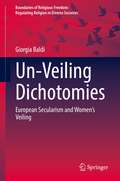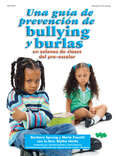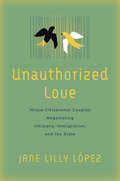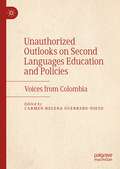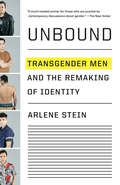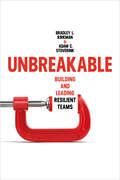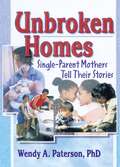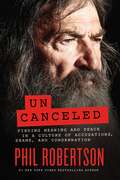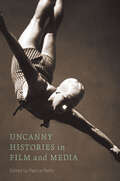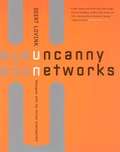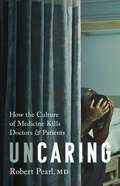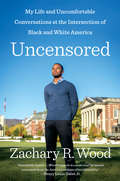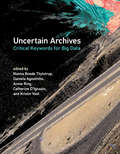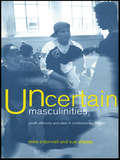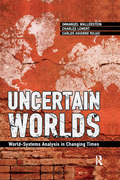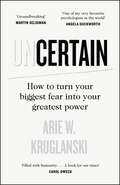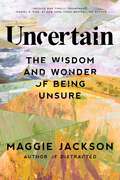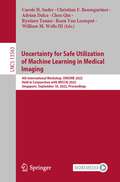- Table View
- List View
Umweltschutz in katholischen Orden: Interpretieren, Bewerten und Verhandeln als Teilprozesse der Glokalisierung (Veröffentlichungen der Sektion Religionssoziologie der Deutschen Gesellschaft für Soziologie)
by Jiska GojowczykUmweltschutzziele wie die Bewahrung der Schöpfung werden selbst in hierarchisch organisierten Gemeinschaften wie katholischen Orden auf unterschiedlichste Weise interpretiert, bewertet und verhandelt. Während manche Mitbrüder der gleichen Kommunität basierend auf einem Ziel ganz verschieden handeln, interpretieren andere es auch über geographische und nationale Grenzen hinweg sehr ähnlich. Mit der vorliegenden ethnographischen Studie werden die Unterschiede und Gemeinsamkeiten erkennbar. Es zeigt sich: Das Ziel einer Gemeinschaft markiert nicht einen Weg, sondern viele. Wer religiösen Umweltschutz untersucht, sollte deswegen mehr als einen Weg bedenken – einschließlich Umleitungen und Kreuzungen.
Un-Veiling Dichotomies: European Secularism and Women’s Veiling (Boundaries of Religious Freedom: Regulating Religion in Diverse Societies)
by Giorgia BaldiThis book analyzes the implication of secular/liberal values in Western and human rights law and its impact on Muslim women. It offers an innovative reading of the tension between the religious and secular spheres. The author does not view the two as binary opposites. Rather, she believes they are twin categories that define specific forms of lives as well as a specific notion of womanhood. This divergence from the usual dichotomy opens the doors for a reinterpretation of secularism in contemporary Europe. This method also helps readers to view the study of religion vs. secularism in a new light. It allows for a better understanding of the challenges that contemporary Europe now faces regarding the accommodation of different religious identities. For instance, one entire section of the book concerns the practice of veiling and explores the contentious headscarf debate. It features case studies from Germany, France, and the UK. In addition, the analysis combines a wide range of disciplines and employs an integrated, comparative, and inter-disciplinary approach. The author successfully brings together arguments from different fields with a comparative legal and political analysis of Western and Islamic law and politics. This innovative study appeals to students and researchers while offering an important contribution to the debate over the role of religion in contemporary secular Europe and its impact on women’s rights and gender equality.
Una Serie introductoria: Un enfoque sociocultural del comportamiento
by Connor Whiteley¿Cómo afecta la globalización a nuestro comportamiento? ¿Afecta nuestra cultura a nuestros hábitos de compra? ¿Podría la aculturación explicar los niveles de obesidad en los emigrantes? Estas son sólo algunas de las preguntas interesantes e importantes que exploraremos en este libro mientras exploramos cómo los factores sociales y culturales afectan nuestro comportamiento. Así que, únanse a mí mientras exploramos juntos el fascinante mundo de la psicología social en este libro con un tono de conversación intrigante que claramente desglosa y evalúa críticamente los conceptos y teorías para que todos puedan disfrutar de las maravillas de la psicología.... ¡y no tengan un dolor de cabeza al final!
Una guía de prevención de bullying y burlas: en salones de clases de pre-escolar
by Dr Blythe Hinitz Barbara Sprung Merle FroschlDurante los años pre-escolares la mayoría de los niños tienen sus primeras experiencias de formación y unión social con sus pares. Durante los años pre-escolares es natural que los niños experimentan con interacciones sociales mientras aprenden sobre el mundo. Cuando el colegio logra crear un ambiente de cuidado mutuo se reduce la posibilidad de que los niños manifiesten un comportamiento negativo (así como la burla y la intimidación). Con la nueva traducción del libro Una guía de prevención de bullying y burlas en salones de clases de pre-escolar, los maestros de niños pequeños pueden abordar estos comportamientos antes de que se desarrollen.El acoso y la burla puedan tener un impacto negativo en el aprendizaje del niño, afectando su salud física y su bienestar emocional. El libro Una guía de prevención de bullying y burlas en salones de clases del pre-escolar comparte actividades, que puedan tomar lugar en el salón de clases y con la participación de la familia para desarrollar la empatía en los niños creando un clima de respeto mutuo en el salón. Hay más de 40 actividades que se enfocan en disminuir y controlar la burla y la intimidación mientras cultivan la amistad, la comunidad y los sentimientos positivos; los maestros de niños pequeños aprenden a crear un ambiente en el que todos los niños se sienten seguros, cómodos y bienvenidos.Barbara Sprung y Merle Froschl son las co-directoras del Educational Equity Center (EEC). Dra. Blythe Hinitz es la coordinadora y catedrática de enseñanza de la educación pre-escolar en The College of New Jersey (TCNJ).
Unaccompanied: The Plight of Immigrant Youth at the Border (Critical Perspectives on Youth #11)
by Emily Ruehs-NavarroExplores how humanitarian aid workers help and hinder the care of unaccompanied children as they arrive in the United StatesEvery year, tens of thousands of children cross into the United States without a legal guardian at their side, often fleeing violence and poverty in their countries of origin. In Unaccompanied, Emily Ruehs-Navarro shows us one aspect of their heartbreaking journeys, as seen through the eyes of the aid workers who try—but too often fail—to help them. Drawing on interviews with aid workers, migrant children, and others, Ruehs-Navarro follows unaccompanied youth as they seek help from a wide range of professionals. From legal relief organizations to family reunification specialists, she shows us how different aid workers may choose to work for, with, or against unaccompanied immigrant youth, deciding whether they should be treated as refugees, child dependents, or, in some cases, criminals. Ruehs-Navarro highlights how aid workers, and the systems they represent, often harm the very children they are designed to help. Unaccompanied brings into focus the plight of immigrant youth at the border, illuminating our failure to manage the human casualties of a growing crisis.
Unaffordable: American Healthcare from Johnson to Trump
by Jonathan EngelWritten for nonexperts, this is a brisk, engaging history of American healthcare from the advent of Medicare and Medicaid in the 1960s to the impact of the Affordable Care Act in the 2010s. Step by step, Jonathan Engel shows how we arrived at our present convoluted situation, where generic drugs prices can jump 1,000 percent in a day and primary care physicians can lose 20 percent of their income at the stroke of a Congressional pen. Unaffordable covers, in a conversational style punctuated by apt examples, topics ranging from health insurance, pharmaceutical pricing, and physician training to health maintenance organizations and hospital networks. Along the way, Engel introduces approaches that other nations have taken in organizing and paying for healthcare and offers insights on ethical quandaries around end-of-life decisions, neonatal care, life-sustaining treatments, and the limits of our ability to define death. While describing the political origins of many of the federal and state laws that govern our healthcare system today, he never loses sight of the impact that healthcare delivery has on our wallets and on the balance sheets of hospitals, doctors' offices, government agencies, and private companies.
Unauthorized Love: Mixed-Citizenship Couples Negotiating Intimacy, Immigration, and the State
by Jane Lilly LópezA rich, narrative exploration of the ways love defies, survives, thrives, and dies as lovers contend with US immigration policy. For mixed-citizenship couples, getting married is the easy part. The US Supreme Court has confirmed the universal civil right to marry, guaranteeing every couple's ability to wed. But the Supreme Court has denied that this right to marriage includes married couples' right to life, liberty, and the pursuit of happiness on US soil, creating a challenge for mixed-citizenship couples whose individual-level rights do not translate to family-level protections. While US citizens can extend legal inclusion to their spouses through family reunification, they must prove their worthiness and the worthiness of their love before their relationship will be officially recognized by the state. In Unauthorized Love, Jane López offers a comprehensive, critical look at US family reunification law and its consequences as experienced by 56 mixed-citizenship American couples. These couples' stories––of integration and alienation, of opportunity and inequality, of hope and despair––make tangible the consequences of current US immigration laws that tend to favor Whiteness, wealth, and heteronormativity, as well as the individual rather than the family unit, in awarding membership and official belonging. In examining the experiences of couples struggling to negotiate intimacy under the constraints of immigration policy, López argues for a rethinking of citizenship as a family affair.
Unauthorized Outlooks on Second Languages Education and Policies: Voices from Colombia
by Carmen Helena Guerrero-NietoThis edited book presents a critical vision of language and education policies and practices in Colombia, examining neoliberal perspectives which influence the promotion of English at all levels in the Colombian educational system. Some of the chapters emphasize questions of language teacher recognition and empowerment, while others focus on both teachers and students’ visions of national policies, particularly with regard to colonial and Eurocentric discourses and subsequent discriminatory practices. The volume throws light on recent language and education policies and practices in a South American country where much current research in this area is published in Spanish but not in English, and it gives visibility to voices that are often missing from the global conversation around English language teaching (ELT). Making these voices heard is part of a decolonial project that gives legitimacy to "unauthorized outlooks", embodies knowledge, and focuses on presenting alternatives to second language teaching-learning and research practices from the Global North ontoepistemology. This book will be of interest to students and scholars of ELT, Language Policies and Planning, Applied Linguistics, and Postcolonial and Decolonial Studies. It also has international appeal, as its localized gaze can bring about important considerations regarding other local knowledges.
Unbound: Transgender Men and the Remaking of Identity
by Arlene SteinAn intimate portrait of a new generation of transmasculine individuals as they undergo gender transitions Award-winning sociologist Arlene Stein takes us into the lives of four strangers who find themselves together in a sun-drenched surgeon’s office, having traveled to Florida from across the United States in order to masculinize their chests. <P><P>Ben, Lucas, Parker, and Nadia wish to feel more comfortable in their bodies; three of them are also taking testosterone so that others recognize them as male. <P>Following them over the course of a year, Stein shows how members of this young transgender generation, along with other gender dissidents, are refashioning their identities and challenging others’ conceptions of who they are. <P>During a time of conservative resurgence, they do so despite great personal costs. <P>Transgender men comprise a large, growing proportion of the trans population, yet they remain largely invisible. In this powerful, timely, and eye-opening account, Stein draws from dozens of interviews with transgender people and their friends and families, as well as with activists and medical and psychological experts. <P>Unbound documents the varied ways younger trans men see themselves and how they are changing our understanding of what it means to be male and female in America.
Unbreakable: Building and Leading Resilient Teams
by Bradley L. Kirkman Adam StoverinkAn essential guide for managers and leaders on building resilient teams in turbulent times. As a result of global economic changes, new technologies, and increased competition, business environments are becoming increasingly turbulent and unpredictable, requiring new forms of resilient work teams. Due in part to the increasing complexity of business environments, more and more organizations worldwide are using teams of employees to respond to adversity. Whether it be new product development teams; business crisis response teams in companies; front line response teams such as fire, emergency medical technicians, or emergency room teams; research and development teams; or pharmaceutical development teams, employees can no longer rely on their own knowledge, skills, and abilities to get their work done. Rather, employees have to work collaboratively with one another and combine their expertise to achieve the synergy and breakthrough thinking that is necessary to be successful at completing complex tasks in today's dynamic environments. Today more than ever before, work teams must demonstrate resilience. In the face of volatile, complex, and ambiguous business environments, all teams inevitably suffer setbacks. Bradley L. Kirkman and Adam C. Stoverink provide in their new book the hands-on practical tips for building and leading resilient teams equipped to bounce back from those challenges. They highlight four team resources that are essential to any resilient team, including: team confidence, teamwork roadmaps, capacity to improvise, and psychological safety. These four resources are brought to life through compelling stories of teams that performed well in the face of adversity—and a few that didn't. They also provide leaders with step-by-step guidance for how to grow these resources in their own teams, whether they're in-person, remote, or hybrid. This book delivers all the tools necessary to build and lead resilient teams that are virtually unbreakable.
Unbroken Homes: Single-Parent Mothers Tell Their Stories
by J Dianne Garner Wendy A PatersonExplore the real-life triumphs and tragedies of single-parent mothers!Unbroken Homes is a “story quilt” of personal narratives constructed from in-depth, case study interviews of five single-parent mothers. The book chronicles their journeys as mothers, daughters, and women, in relationships and in solitude, displaying their stories in their own words like the squares of a multicolored quilt. Unbroken Homes breaks through the stigma associated with “broken homes” and provides a new perspective on the reorganization of American families.Unbroken Homes encourages you to rethink some damaging stereotypical assumptions about children from single-mother headed homes. Drawing information from family research, counseling, and a cross-section of social sciences, this book is pertinent to any professional who works with single parents or their children. Unbroken Homes does not deal with what is “typical” in the single-parenting experience, nor does it give advice or proselytize. Rather, its purpose is to discover the meaning that single-parent mothers bring to their own lives, helping you to understand the dynamics of single-parent families from a uniquely personal perspective.In Unbroken Homes you will witness the ways that these women: experience the ill effects of gender role socialization work to overcome stigma redefine ideals for family life and gender expectations balance responsibilities in and outside of their homes stretch finances to meet the needs of their families regain strength and self-confidence encourage their children's development affirm the strength of their families cope with depression develop networks of supportThis intensely personal collection of women's stories and reflections is a must read for everyone who seeks a better understanding of divorce, single-parenting, and being alone, from an insider's perspective.
Uncanceled: Finding Meaning and Peace in a Culture of Accusations, Shame, and Condemnation
by Phil RobertsonWin the War for Your Own IntegrityAfter Phil Robertson quoted Scripture in an interview with a national magazine, his hit show, Duck Dynasty, put him on &“indefinite hiatus.&” Phil immediately knew what had happened: he had become a target of cancel culture.Since that time, Phil has spoken out against public shaming, strategic campaigns to get Bible-believing employees fired, and other tactics that are wreaking havoc in our society. In a deeply divided country, with so many bent on condemning and silencing others, Phil calls for us to carry out the unifying message of Jesus Christ.In Uncanceled, Phil shares his own experiences with cancel culture as heencourages us to turn to Scripture as we navigate politics, personal conversations, and new cultural norms;helps us see the psychological and political motivations behind silencing conservative voices;reminds us that the goal is not to convince others to like us but to win the war for our own integrity by refusing to bow down to the god of political correctness; andshows us how to trade retaliation for the love and forgiveness that God offers.Uncanceled is a blueprint for standing up for the truth of Jesus Christ in a culture that has forgotten how to have respectful conversations. As Phil reminds us, when we embrace the truth that Jesus Christ already paid an enormous debt to cancel our sins, we find a path to redemption, a way to forgiveness, and a means for godly connection.
Uncanny Australia: Sacredness and Identity in a Postcolonial Nation
by Ken Gelder Jane M JacobsAboriginal claims for sacredness in modern Australia may seem like minor events, but they have radically disturbed the nation's image of itself. Minorities appear to have too much influence; majorities suddenly feel embattled. What once seemed familiar can now seem disconcertingly unfamiliar, a condition Ken Gelder and Jane M. Jacobs diagnose as 'uncanny'. In Uncanny Australia Gelder and Jacobs show how Aboriginal claims for sacredness radiate out to affect the fortunes, and misfortunes, of the modern nation. They look at Coronation Hill, Hindmarsh Island, Uluru and the repatriation of sacred objects; they examine secret business in public places, promiscuous sacred sites, ghosts and bunyips, cartographic nostalgia, reconciliation and democracy, postcolonial racism and New Age enchantments. Uncanny Australia is a challenging and thought-provoking work that offers a new way of understanding how the Aboriginal sacred inhabits the modern nation.
Uncanny Histories in Film and Media (Media Matters)
by Priya Jaikumar Masha Salazkina Peter Bloom Ellen C. Scott Cristina Venegas Jasmine Nadua Trice Alenda Chang Maria Corrigan Naomi DeCelles Hannah GoodwinUncanny Histories in Film and Media brings together a stellar lineup of established and emergent scholars who explore the uncanny twists and turns that are often occluded in larger accounts of film and media. Prompted by fresh archival research and new conceptual approaches, the works included here probe the uncanny as a mode of historical analysis that reveals surprising connections and unsettling continuities. The uncanny stands for what often eludes us, for what remains unfamiliar or mysterious or strange. Whether writing about film movements, individual works, or the legacies of major or forgotten critics and theorists, the contributors remind us that at the heart of the uncanny, and indeed the writing of history, is a troubling of definitions, a challenge to our inherited narratives, and a disturbance of what was once familiar in the uncanny histories of our field.
Uncanny Networks: Dialogues With the Virtual Intelligentsia
by Geert LovinkFor Geert Lovink, interviews are imaginative texts that can help create global, networked discourses not only among different professions but also among different cultures and social groups. Conducting interviews online, over a period of weeks or months, allows the participants to compose documents of depth and breadth, rather than simply snapshots of timely references.
Uncanny Valley: A Memoir
by Anna WienerThe prescient, page-turning account of a journey in Silicon Valley: a defining memoir of our digital age <P><P>In her mid-twenties, at the height of tech industry idealism, Anna Wiener—stuck, broke, and looking for meaning in her work, like any good millennial--left a job in book publishing for the promise of the new digital economy. She moved from New York to San Francisco, where she landed at a big-data startup in the heart of the Silicon Valley bubble: a world of surreal extravagance, dubious success, and fresh-faced entrepreneurs hell-bent on domination, glory, and, of course, progress. <P><P>Anna arrived amidst a massive cultural shift, as the tech industry rapidly transformed into a locus of wealth and power rivaling Wall Street. But amid the company ski vacations and in-office speakeasies, boyish camaraderie and ride-or-die corporate fealty, a new Silicon Valley began to emerge: one in far over its head, one that enriched itself at the expense of the idyllic future it claimed to be building. Part coming-of-age-story, part portrait of an already-bygone era, Anna Wiener’s memoir is a rare first-person glimpse into high-flying, reckless startup culture at a time of unchecked ambition, unregulated surveillance, wild fortune, and accelerating political power. With wit, candor, and heart, Anna deftly charts the tech industry’s shift from self-appointed world savior to democracy-endangering liability, alongside a personal narrative of aspiration, ambivalence, and disillusionment. <P><P>Unsparing and incisive, Uncanny Valley is a cautionary tale, and a revelatory interrogation of a world reckoning with consequences its unwitting designers are only beginning to understand.
Uncaring: How the Culture of Medicine Kills Doctors and Patients
by Robert PearlDoctors are taught how to cure people. But they don&’t always know how to care for them.Hardly anyone is happy with American healthcare these days. Patients are getting sicker and going bankrupt from medical bills. Doctors are burning out and making dangerous mistakes. Both parties blame our nation&’s outdated and dysfunctional healthcare system. But that&’s only part of the problem.In this important and timely book, Dr. Robert Pearl shines a light on the unseen and often toxic culture of medicine. Today&’s physicians have a surprising disdain for technology, an unhealthy obsession with status, and an increasingly complicated relationship with their patients. All of this can be traced back to their earliest experiences in medical school, where doctors inherit a set of norms, beliefs, and expectations that shape almost every decision they make, with profound consequences for the rest of us.Uncaring draws an original and revealing portrait of what it&’s actually like to be a doctor. It illuminates the complex and intimidating world of medicine for readers, and in the end offers a clear plan to save American healthcare.
Uncensored: My Life and Uncomfortable Conversations at the Intersection of Black and White America
by Zachary R. WoodRooted in his own powerful personal story, twenty-one-year-old Zachary Wood shares his dynamic perspective on free speech, race, and dissenting opinions--in a world that sorely needs to learn to listen.As the president of the student group Uncomfortable Learning at Williams College, Zachary Wood knows all about intellectual controversy. From John Derbyshire to Charles Murray, there's no one Zach refuses to debate or engage with simply because he disagrees with their beliefs--sometimes vehemently so--and this controversial view has given him a unique platform on college campuses and in the media.But Zach has never shared the details of his own personal story, and how he came to be a crusader for open dialogue and free speech. In Uncensored, he reveals for the first time how he grew up poor and black in Washington, DC, in an environment where the only way to survive was to resist the urge to write people off because of their backgrounds and their perspectives. By sharing his troubled upbringing--from a difficult early childhood filled with pain, uncertainty, and conflict to the struggles of code-switching between his home in a rough neighborhood and his elite private school--Zach makes a compelling argument for a new way of interacting with others, in a nation and a world that has never felt more polarized. In Uncensored, he hopes to foster a new outlook on society's most difficult conversations, both on campus and beyond.
Uncertain Archives: Critical Keywords for Big Data
by Annie Ring Nanna Bonde Thylstrup Kristin Veel Catherine D'Ignazio Daniela AgostinhoScholars from a range of disciplines interrogate terms relevant to critical studies of big data, from abuse and aggregate to visualization and vulnerability.This pathbreaking work offers an interdisciplinary perspective on big data, interrogating key terms. Scholars from a range of disciplines interrogate concepts relevant to critical studies of big data--arranged glossary style, from from abuse and aggregate to visualization and vulnerability--both challenging conventional usage of such often-used terms as prediction and objectivity and introducing such unfamiliar ones as overfitting and copynorm. The contributors include both leading researchers, including N. Katherine Hayles, Johanna Drucker and Lisa Gitelman, and such emerging agenda-setting scholars as Safiya Noble, Sarah T. Roberts and Nicole Starosielski.
Uncertain Masculinities: Youth, Ethnicity and Class in Contemporary Britain
by Sue Sharpe Mike O'DonnellIn this era of rapid and unsettling change, boys now more than ever face difficulties in establishing their self-image and status. In this original and challenging study Mike O'Donnell and Sue Sharpe explore how teenage boys from white, African-Caribbean and Asian backgrounds negotiate contemporary uncertainties to construct their gender identities.Drawing theoretical insights about how class, race and ethnicity critically affect the formulation of masculinities throughout, the authors examine:* the discrepancies between boys and girls' attitudes and expectations* the split between boys' formal acceptance of politically correct ideas and their informal behaviour amongst the peer group* boys' leisure pursuits including involvement in illegal activities and their selective identification with global youth culture.Uncertain Masculinities is a fascinating account of the complexity of contemporary boys' identities and will be of use to students of the sociology of youth and of gender studies.
Uncertain Tastes: Memory, Ambivalence, and the Politics of Eating in Samburu, Northern Kenya
by Jon HoltzmanThis richly drawn ethnography of Samburu cattle herders in northern Kenya examines the effects of an epochal shift in their basic diet from a regimen of milk, meat, and blood to one of purchased agricultural products.
Uncertain Worlds: World-systems Analysis in Changing Times
by Charles C. Lemert Immanuel Wallerstein Carlos Aguirre RojasUncertain Worlds is the definitive presentation of the evolution of world-systems analysis from the point of view of its founder, Immanuel Wallerstein. Few theorists have offered a more systematic theory of what has become known as 'globalisation' than Wallerstein. The book includes a one-of-kind interview with Wallerstein by Carlos Rojas, a conversation between Wallerstein and Lemert about the history of the field as it has come down to the present time, a long essay by Lemert on the uncertainties of the modern world-system, as well as a preface by Rojas and a concluding essay by Wallerstein. No other book lends such biographical, historical, and personal nuance to the biography of world-systems analysis and, thus, to the history of our times. The will be a key reference book for students of global politics, economics and international relations.
Uncertain: How to Turn Your Biggest Fear into Your Greatest Power
by Arie KruglanskiTO ACHIEVE THE EXTRAORDINARY, FIRST EMBRACE THE UNKNOWN . . .Discover the definitive guide to our fear of uncertainty, and how we can stop it from holding us back'Groundbreaking' MARTIN SELIGMAN'One of my very favorite psychologists in the world' ANGELA DUCKWORTH'This is the book we've been waiting for' CAROL DWECK, bestselling author of Mindset: The New Psychology of Success____________Do you fear uncertainty?Why is the unknown so paralysing?And how can we use doubt to our advantage?Our safe modern world has wired us to fear the unknown, rather than use it to our benefit. But what if there was a way of turning that uncertainty into our greatest strength? Imagine being able to make important decisions without anxiety. Imagine being the calm at the centre of every storm.In Uncertain, the world-renowned psychologist Professor Arie Kruglanski shows us that there's only one certain way to face the unknown, and that is to fundamentally change the way we perceive it.This definitive book will transform the way you think about the unknown. Suddenly, you'll stop fearing uncertainty and learn to not only face it, but also harness the power that comes with it.Don't let uncertainty rule your life.Instead, embrace it and achieve the extraordinary.____________'This groundbreaking book is the place to go to discover how to embrace uncertainty and turn it to your growth and benefit' Martin Seligman, author of The Hope Circuit'One of my very favorite psychologists in the world tackles a subject that is both timeless and timely [and] shows us that though uncertainty is inevitable, how we react to it is not' Angela Duckworth, bestselling author of Grit'This is the book we've been waiting for. With his tremendous spirit, wit, knowledge, and wisdom, Kruglanski give us a book that helps us understand and navigate the uncertain world we live in. It's both based on science and filled with humanity-with deep compassion and benevolent guidance. It is a book for our time' Carol Dweck, author of Mindset: The New Psychology of Success'If you're not sure if you need this book, then you do. Original, insightful, and thought-provoking, the world's expert on the psychology of uncertainty reveals what science can tell us about our lives on the razor's edge' Daniel Gilbert, the New York Times bestselling author of Stumbling on Happiness'If there's anything I'm certain about, is that you'll love this book' Ayelet Fishbach, author of Get It Done
Uncertain: The Wisdom and Wonder of Being Unsure
by Maggie JacksonA revolutionary guide to flourishing in times of flux and angst by harnessing the overlooked power of our uncertainty. <P><P>In an era of terrifying unpredictability, we race to address complex crises with quick, sure algorithms, bullet points, and tweets. How could we find the clarity and vision so urgently needed today by being unsure? Uncertain is about the triumph of doing just that. A scientific adventure tale set on the front lines of a volatile era, this epiphany of a book by award-winning author Maggie Jackson shows us how to skillfully confront the unexpected and the unknown, and how to harness not-knowing in the service of wisdom, invention, mutual understanding, and resilience. <P><P>Long neglected as a topic of study and widely treated as a shameful flaw, uncertainty is revealed to be a crucial gadfly of the mind, jolting us from the routine and the assumed into a space for exploring unseen meaning. Far from luring us into inertia, uncertainty is the mindset most needed in times of flux and a remarkable antidote to the narrow-mindedness of our day. <P><P>In laboratories, political campaigns, and on the frontiers of artificial intelligence, Jackson meets the pioneers decoding the surprising gifts of being unsure. Each chapter examines a mode of uncertainty-in-action, from creative reverie to the dissent that spurs team success. Step by step, the art and science of uncertainty reveal being unsure as a skill set for incisive thinking and day-to-day flourishing.
Uncertainty for Safe Utilization of Machine Learning in Medical Imaging: 4th International Workshop, UNSURE 2022, Held in Conjunction with MICCAI 2022, Singapore, September 18, 2022, Proceedings (Lecture Notes in Computer Science #13563)
by William M. Wells III Adrian Dalca Ryutaro Tanno Carole H. Sudre Christian F. Baumgartner Koen Van Leemput Chen QinThis book constitutes the refereed proceedings of the Fourth Workshop on Uncertainty for Safe Utilization of Machine Learning in Medical Imaging, UNSURE 2022, held in conjunction with MICCAI 2022. The conference was hybrid event held from Singapore. For this workshop, 13 papers from 22 submissions were accepted for publication. They focus on developing awareness and encouraging research in the field of uncertainty modelling to enable safe implementation of machine learning tools in the clinical world.

